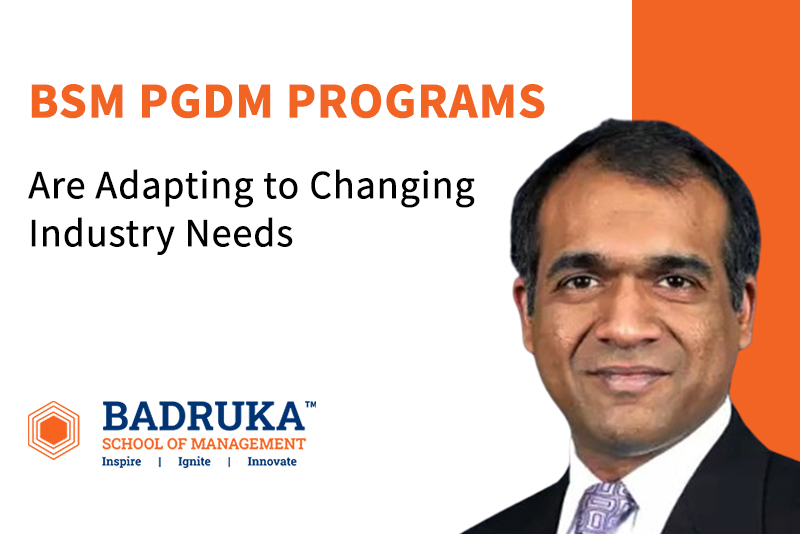The Badruka School of Management (BSM) recognizes the dynamic nature of the business landscape and the evolving demands of the future of work. In today’s rapidly evolving global landscape, the future of work is undergoing significant transformations. With advancements in technology, changes in consumer behavior, and the emergence of new industries, the skills required to succeed in the workplace are constantly evolving. To stay ahead in this dynamic environment, educational institutions must adapt their programs to meet the changing needs of the industry. This article explores how the Badruka School of Management’s PGDM programs are evolving to prepare students for the future of work.To adapt to changing industry needs, BSM’s PGDM programs are incorporating several key strategies:
- Agile Curriculum Design: BSM regularly reviews and updates its curriculum to align with the latest industry trends, technological advancements, and emerging business practices. The curriculum is designed to be agile, flexible, and responsive to the evolving needs of various industries.
- Industry-Relevant Specializations: BSM offers specialized tracks or concentrations within its PGDM programs that cater to specific industry sectors such as finance, marketing, human resources, operations, information technology, and entrepreneurship. These specializations equip students with in-depth knowledge and skills relevant to their chosen career paths.
- Integration of Technology: BSM integrates cutting-edge technologies such as data analytics, artificial intelligence, machine learning, blockchain, and digital marketing into its curriculum. Students learn how to leverage these technologies to drive innovation, improve decision-making, enhance operational efficiency, and create value for organizations.
- Experiential Learning: BSM emphasizes experiential learning through industry projects, internships, simulations, case studies, and live consulting assignments. These hands-on experiences allow students to apply theoretical concepts in real-world scenarios, develop problem-solving skills, and gain practical insights into industry dynamics.
- Soft Skills Development: In addition to technical skills, BSM focuses on developing students’ soft skills such as communication, leadership, teamwork, adaptability, emotional intelligence, and cross-cultural competence. These skills are crucial for thriving in diverse work environments and assuming leadership roles.
- Global Perspective: BSM promotes a global mindset by offering international exchange programs, cross-cultural workshops, and guest lectures by global business leaders. Students gain exposure to global business practices, cultural nuances, and international markets, preparing them for careers in multinational corporations or global roles.
- Entrepreneurship and Innovation: BSM fosters an entrepreneurial mindset among students through courses on entrepreneurship, innovation management, startup incubation, and venture capital. Students learn how to identify opportunities, develop business plans, pitch ideas, and launch successful ventures in the rapidly changing business landscape.
- Continuous Learning and Professional Development: BSM encourages lifelong learning and professional development through executive education programs, workshops, seminars, webinars, and networking events. Alumni engagement initiatives ensure that graduates stay connected with industry trends, best practices, and career opportunities.
- Collaboration with Industry Partners: BSM collaborates closely with industry partners, corporate sponsors, professional associations, and alumni networks to co-create programs, offer industry certifications, provide guest lectures, facilitate internships, and support placement opportunities for students.
Conclusion: The Future of Work and the Role of Adaptive PGDM Programs
As we look ahead to the future of work, one thing is clear: adaptation is key to success. By adopting these strategies, the Badruka School of Management’s PGDM programs stay at the forefront of preparing students for the future of work, equipping them with the knowledge, skills, mindset, and networks needed to succeed in a rapidly changing and competitive business environment.
The Badruka School of Management’s PGDM programs exemplify this ethos, offering a dynamic and industry-relevant education that prepares students for the challenges and opportunities of tomorrow’s workplace. By embracing innovation, fostering collaboration, and prioritizing student success, Badruka is shaping the future of management education and empowering the next generation of business leaders.
Learn more about BSM’s PGDM curriculum.
FAQs
Have some questions regarding the PGDM programme?

Education
- PhD (Major: Production and Operations Management; Minor: Industrial Engineering), Foster School of Business, University of Washington, Seattle (USA)
- MBA, Foster School of Business, University of Washington, Seattle (USA)
- BTech (Mechanical Engineering), IIT Kanpur (India)
Dr. Aggarwal is currently serving as the Founder and President of Eduserve Global Associates, a consultancy specializing in higher education advisory and process excellence services. With a profound commitment to academic excellence, Dr. Aggarwal has held key leadership positions in esteemed institutions, including Vice Chancellor at Bennett University, President (Vice Chancellor) at NIIT University, and Founding Vice Chancellor at O.P. Jindal University.
His career spans continents, with notable contributions to the College of William and Mary, and the University of Washington Business School in the United States. He is an active speaker, consultant, teacher, and researcher and has published in leading journals on operations management, including Operations Research, and the Journal of International Technology and Information Management.




